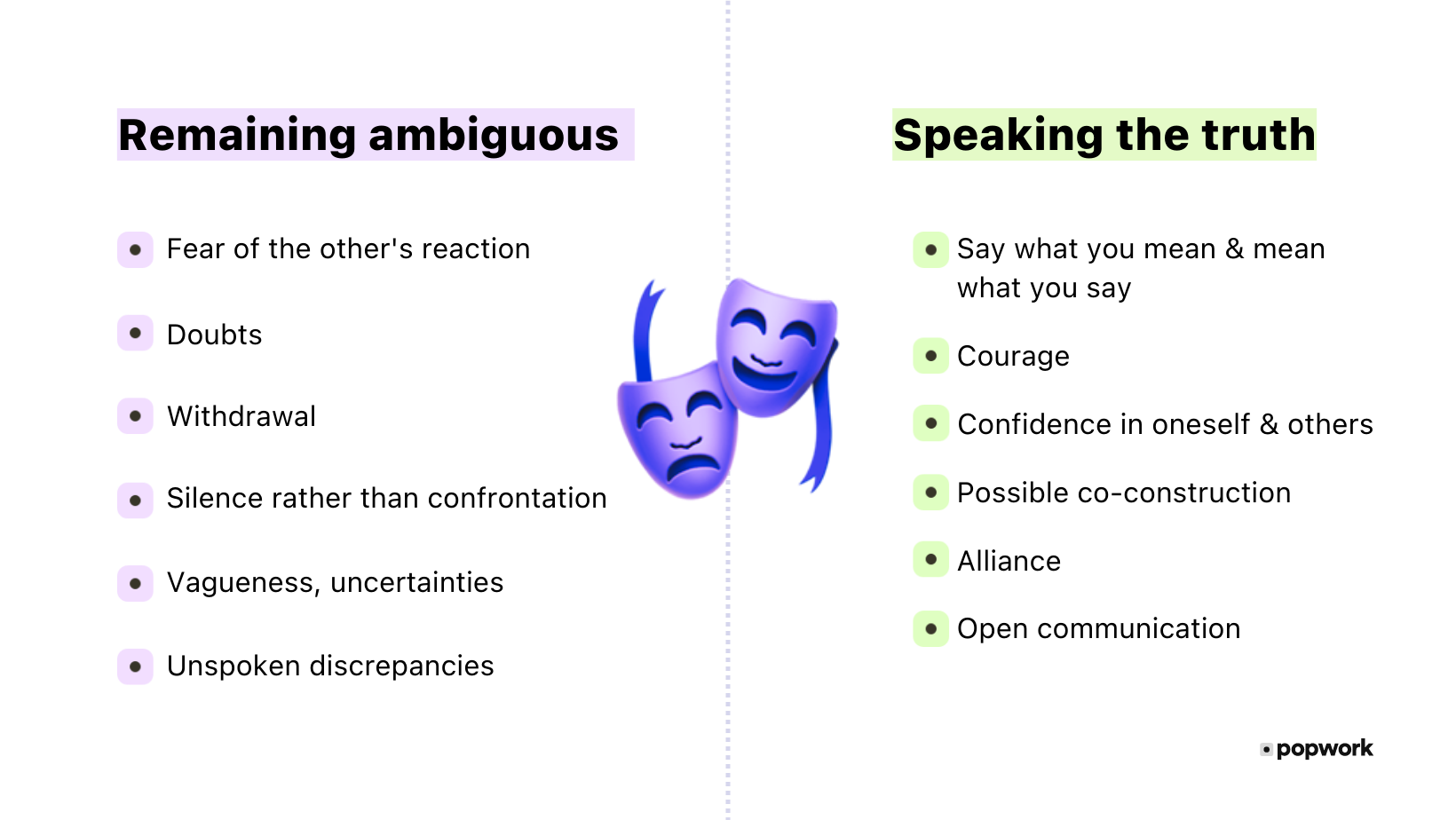As a professional coach, I accompany companies, managers and individuals to help them manage their professional relationships, manage their emotions and drive more operational efficiency.
I am a former production manager for talk shows and have always been interested in relationships - towards ourselves and others - and especially the image we have of ourselves or the one we allow others to see.
The screen of our computers becomes the filter through which we read the reality of our hierarchical or commercial relationships.
"The map is not the territory": we only bring to our consciousness a tiny part of reality, which opens the door to our cognitive biases and our errors of interpretation.
Our computer screen, a kind of porthole through which we look at “our world”, changes according to our experience of different situations.
Our state of mind, our thought patterns, our emotions, our beliefs, our past experiences are reflected on this screen and blur what we see.
🛡 The screen as a shield
I was called by a company to coach Gilles, a 35-year-old manager, who was a fan of “agile” methods.
Gilles has just been appointed manager of a team of IT developers and salespeople.
The team had been working together for ten years. The team members know each other well and their emotional ties are strong.
Gilles realizes quite quickly that his management methods are not accepted by the team. A clash with the team convinced him things were not working out.
When Gilles offered to adopt the Slack messaging app upon his arrival to streamline communications, the team replied: “If you want to talk to us, get up and walk to our desks. We are no longer young enough to play video games! ".
It was at this time that Gilles wanted to benefit from professional coaching with the aim of improving his communication with the team.
My support allowed Gilles to understand that it was not a generational problem or a major issue with Slack itself or any other form of messaging apps. It was an emotional problem that the screen revealed.
Gilles perceived a close-knit group, "facing" him and unconsciously, he felt safer to "talk" to them from behind a screen.
The screen, like a shield, protected him from direct confrontation with the group.
Slack allowed him to avoid facing the group by staying in the security of online chats and in his comfort zone!
Gilles was worried about his relationship with the group: rejection of his methods, his personality, etc. Slack was primarily, consciously or not, an avoidance strategy.
The screen was for him a protective shield to “face” the team.
Through the questioning process of coaching, Gilles became aware of the importance of informal communication in the functioning of this “affective” team where everyone takes care of one another.
I coached Gilles on the development of solutions allowing him to go beyond his relational discomfort. Today he accepts less direct and more informal relationships than he once would have taken for a waste of time.
He realized that for this affective team, it was there that performance was built: the desire to work together, co-construction of solutions, positive team dynamics.
Result: Gilles abandoned the screen as a shield and was able to communicate better, work better and drive successful projects with his team. He built a trusted relationship with the team.
The Slack app became a support tool for more fluid and efficient peaceful communication with the team.
🚔 The screen as a paradox
In this period of hybrid and remote work, where the professional sphere can take over our personal space, the screen becomes a protective shield at the same time as an instrument of intrusion.
Everyone has their own perception of the screen depending on the moment, their hierarchical position, their self-confidence and their self-esteem.
Friend or foe, the screen becomes a mirror of our projections and our judgments on ourselves as much as on our interlocutors.
If we are not careful, our benevolence moves away in favor of projections and judgments on ourselves and on our interlocutors.
🪞 The screen as a mirror
- A story full of emotions between Me and Me
The Snow White syndrome: Screen, my beautiful screen, who is the most beautiful, the best speaker, the best organized, etc. ?
In this metaphor, we permanently embody the Evil Queen in a charge against ourselves.
How are we going to choose to accept ourselves or transform ourselves to meet the demands of the stern-looking Queen and her stark criticism?
“Teleworking and screens force people to constantly face their image and become aware of their imperfections because they are constantly looking at themselves in the small (videoconference) thumbnail as in a mirror. They are, despite themselves, in a narcissistic relationship”. explains psychologist Isabelle Pailleau.

- What do I look like and what am I afraid of? What if I am not perfect?
Video conferencing apps offer us background filters that have the effect of making us the center of attention.
We are constantly comparing ourselves to others in small juxtaposed vignettes, tempted by the search for the slightest imperfection in ourselves (judgment) or in others (projection). Projection: we observe by looking at the others through our thought pattern
Judgment: we feel observed and judged and our inner critic takes over.
The years 2020 - 2021 have seen a 20 to 30% increase in demand for cosmetic surgery with a drop in the average age of male and female clients. This trend can be explained by our relationship to our own image: in videoconferencing, our image is permanently on the screen and… we have become adept at taking selfies!
Since Gilles' coaching, I have worked with several clients on their on-screen relationship.
The screen reveals our self-confidence and our fears in our relationships with our interlocutors.
💡 The screen as a revealer
Screen, screen when you hold us… what do you tell us about us?
Alone with ourselves in the mirror, what image do we project on ourselves?
Our screen becomes a mirror in which our image imposes itself on us. We watch each other. We constantly compare ourselves.
Perceived “physical flaws" can turn into complexes: double chin, wrinkles, dark circles under the eyes, ... we only see that.
We become “too much” in our eyes: old, young, fat, thin, tired, etc.
We do not assume to see this image of us that does not resemble the image we have of ourselves.
Note that often appropriate lighting, different positioning of the computer (slightly low angle), the use of a better webcam would allow us to improve the rendering of the small thumbnail, object of all our attention.
To flourish behind a screen is to allow yourself to extend your comfort zone until the acceptance and reassessment of our fears as well as our complexes.

Showing up and speaking behind a screen involves accepting ourselves in all our integrity: going through our fears, accepting the possibility of rejection, injustice, abandonment, humiliation and judgment in order to draw the energy from them. get in touch with our interlocutors behind their screen.
It's about realizing that we don't see ourselves as others see us in the same way that we struggle to recognize our own voice on a recording.
👀 The screen as a controller
When the direct elements of control have disappeared, how can I trust what is no longer in my view? How do I know if my team members are working or playing with their cats?
How can you be sure that he or she is focused on their tasks?
Remote management requires maturity on each side of the screen: what degree of autonomy to give? The most motivated employees are not always the most competent. The reverse is just as true!
On the one hand, the risks of micro-management are great, but on the other, what risks does the manager take in delegating? This questions our relationship to ambiguity, our ability to develop the skills of our team and, consequently, our stance as a manager.
The screen reveals the leadership position of the manager and sometimes his existential crisis: What if my employees could do as well without me? What is the correct positioning in an hybrid model?
🤝 The screen as a lever of trust
Trust cannot be decreed, it is built and communicated in a virtuous circle.
This is all the more true in communication through a screen where ambiguities feed interpretations, sources of stress and misunderstanding.
The unsaid, the silences are weak signals of major importance.

👉 In conclusion: what if the screen was a source of growth?
The screen becomes revealing of pre-existing problems and a source of development through their resolution.
At the same time shield, paradox, mirror, revealer, control or trust, the screen encourages the manager to change his outlook on himself, his management and his interactions with his collaborators.
The discomfort it produces intrinsically motivates us to change.
Thus we expand our zone of confidence from the inside: from ourselves to others.
The screen becomes a source of progress.
I regularly intervene in performance coaching to accompany managers in the transformation from a position of "pilot" who manages, organizes and controls towards that of a "facilitator" who directs the movement, facilitates adaptation and creates the conditions of cooperation.
Accompaniment, face-to-face or remotely, involves setting objectives, exploring possibilities up to awareness and developing solutions that will lead to the realization of change.

